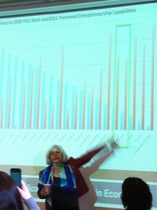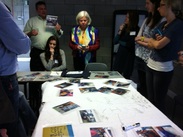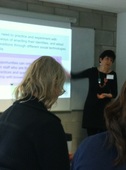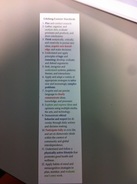 Unkeynote: "Learning Spaces: If learning is to be constant, Space, Time, Technology, Pedagogy, Curriculum must be the Variables." Ira David Socol and Pamela R. Moran with bonus provocateurs, Conor Galvin and Bernie Goldbach Ira's blog is very useful and highlighted some of the issues raised.http://speedchange.blogspot.com/The image shows the Pisa Maths scores versus the perceived entrepreneurship capabilities. The theme throughout the event was to do with 'efficiency', 'saving money' and doing all things for pisa but when it comes down to it, are the kids happy? Are we preparing them for the future?People participated during the discussion and an 11 year old spoke about participating in CoderDoJo and this was his way of learning things outside of school but what he thought was very useful. He isn't being taught this in school. A question was raised about technology being taught as a subject in the classroom. For those of you that haven't seen this subject, this is a mix between manufacturing technology, design and graphics etc. http://www.ncca.ie/uploadedfiles/publications/lc_technology_syllabus.pdf This may be useful for people who are interested in doing design and manufacturing engineering subjects after the Leaving Certificate. Is there a space for technology to be taught and by technology I mean with a focus on computers only? There are jobs popping up everywhere with computers. The main point of the unkeynote was to do with not focusing on curriculum that are creating jobs for the now when we may not be prepared for the future. Search, collaborate, wonder and create imagination studios. Lifelong learning should be focused on. When you go to school the reason why school had a start time and finish time was to do with the industrial age. Now it is time to think of learning continuously. When the school summer starts and there's a break for 3 months, is it time to stop learning? We are fitting kids into the school system instead of listening to them. Similar to the idea that Sir Ken Robinson was known for in his TED video. We place kids into a system organised by age and categories instead of capabilities as such. I must put this video up as well, the power of technology! Remoteness and the quality of education. This reminded me of how much technology has influenced our time. I watched David Attenburgh last night and the big egg and he was in Madagasgar. He said we knew little about the place 50 years ago when he was last there. Now we can go on google maps, go to the streets, look around, have a look at all the documentaries about the place and that is without leaving our seats! Learning spaces can be changed and Ira and Pamela both looked at the different places we go to school and how it might impact on creativity. The Iridescent classroom. Catherine Cronin's talk digital identity is an enmeshed part of atoms and bits. Meet online first or in person the two reinforce each other. Twitter can be used as a great tool to interact with students. Students transcend boundaries and is a great way of connecting between them. Catherine spoke about the 100 word challenge and this was a great interactive talk. Many people were on twitter and there were videos from the author of 100 word challenge. A simple creative writing exercise http://100wc.net/ gets children writing 100 words a week on different topics and they can submit their entries online. This has a way of motivating children and getting them involved in an easy way. Catherine spoke about the Mad House of Ideas, an open source book that people can get involved in. What a great way to stay connected with the world and get your writing published. We also saw a video from the author and they were interacting with us using twitter. A great presentation, very active and interactive. http://madhouseofideas.org/ The Iridescent Classroom - bringing transparency, contagious creativity and intrinsic motivation to every age This was very interesting, almost like a more in-depth discussion of the unkeynote. This was focused around a discussion of lifelong learning and the image below was a bookmark that was handed out. The lifelong-learner standards 1- 12 could be applied to everyone. It strikes me as odd that point 11 is so far down the list. 'Understand and follow a physically active lifestyle that promotes good health and wellness.' You would think that 'your health is your wealth'. I would have put that first as being the most important. As we have seen in recent years that this would be number 1 with all the issues with obesity and depression. As we are all aware of the great studies that show exercise helping with depression.  Ira and Pamela gave out photos from alternative classrooms and how children are learning today. It highlighted the need for less walls and more space for the classroom. Cabinets of curiosity. C in ICT is for Communication. Save money in schools with less walls and less furniture. To round up the day there was another discussion and thoughts of the day. We are sending our kids to work in companies like google where they have slides and they endorse the 80/20 rule. We see this as brilliant when we are restricting the creativity in our classrooms by restricting our pupils for the workplace of tomorrow. Amazon and all the big companies that are known as being great places to work have a 'fun' element and this could be introduced into our classrooms. This was my final thought - Learning can be fun and we can enhance learning by using different learning spaces including virtual worlds.
0 Comments
A great day was had by all. I was at the research seminar and got a chance to take a look at different research. Kathriona McHugh A Qualitative Approach to the Experiences of Early School Leavers within a Youthreach ContextIt was great to take a look at the different experiences of early school leavers and why they leave school at different stages and why they would stay in youthreach for a longer period. They could stay in youthreach for up to the same number of years that they were enrolled in secondary school and want to stay longer. There is an incentive to stay, however, they applied different methods taken from a european framework and implemented it in youthreach to conduct this research. Mary Higgins Applied Learning in a Further Education College: A Model for the 21st century This research looked at the 21st century model and how it goes across all aspects of the college. In all instances the students are exposed to different areas like radio stations, newspapers and have a college of hairdressing involved, all of which use different aspects of applied learning. Peter Mannion The State’s Role in Higher Education: An Examination of Irish Higher Education PolicyThe state's role in higher education was not how I expected and it was very interesting to look at the visual presentation. Different aspects played a role in higher education, different politicians had roles to play. Free fees impacted greatly on higher education policies and timing had an essential part to play. Diogo Gomes Interrogating Dilemmas in Primary level Science Classrooms in Ireland: Outreach and Education Diogo crossed over in aspects of my own research while looking at the Science Classrooms. A brilliant array of ideas for science outreach, I'm sure there will be more to follow. Pooling from the innovation and creativity that kids of the new generation have to offer we could merge different areas and not teach it in isolation. Experimentation in primary schools being one source to stimulate the digital natives! Amy Mc Donald Role Models for Boys: The Implications of Assuming More Male Role Models in Irish Primary Schools is the Answer This touched on different aspects of Irish Primary schooling and how male teachers can race to the top. Some schools have implemented policies whereby they have a minimum ratio to reach of female to male teachers. Amy spoke about the perception of male teachers in primary schooling and the perception of male teachers being role models in primary schooling. Michael Mc Namara
Better or Worse? Teachers’ Perspectives on the Changing Role of Standardised Assessment in Primary School Education in Ireland Michael looked at the different times that standardised tests are given throughout the school year and the impact it has on schooling. The different types of tests and the possibility of some answers being correct. Sigma T's and Micra T's happen at the end of the first term and are not changed year after year. There are many roles that standardised assessment has to play. The challenges teachers are facing at the moment preparing to teach to the test at primary level will be something to look out for in years to come. I am delighted to be presenting at this year's Game Based Learning event that is being held by Dr. Patrick Felicia down in Waterford. http://www.wit.ie/Research/ResearchGroupsCentres/Groups/GameBasedLearning/igbl2012/
A symposium on Game-Based Learning (GBL) will be organised in Waterford Institute of Technology on Thursday 7th June. |
|


